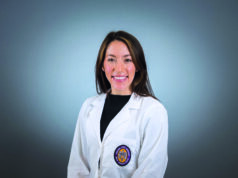
An anonymous vascular resident offers some advice for dealing with a troubling case in the latest edition of our Corner Stitch column by and for vascular surgery trainees.
Little, if anything, in life prepares you for when you eventually cause harm to another human. Intentional or not, medical errors cause significant morbidity and mortality to those we care for. But how do we manage our errors and mitigate moral injury?
As a PGY2 in the surgical intensive care unit (ICU), I found myself in front of an elderly man who underwent emergent surgery overnight for cecal volvulus. He was extubated, stable, and his daughter was at bedside. When I introduced myself, the daughter recognized my last name on my white coat and asked if I was related to a local cardiologist who had performed her father’s transarterial aortic valve replacement. I said yes and immediately she trusted me. I found out later she was an RN who knew my father personally.
His postoperative course was wholly unremarkable. We determined on rounds that, given his elevated CHADSVASC score, to restart anticoagulation on postoperative day two. The surgeon of record was even present to endorse hemostasis gained with low risk of bleeding and concluded the benefits of anticoagulation outweighed those risks. I ordered the heparin drip.
On postoperative day 3 the patient faltered in his otherwise unremarkable post-operative course. He now refused to ambulate and was in atrial fibrillation with rates of 150. He subsequently began to complain of worsening abdominal pain, decreased urinary output, and now had a fever to 102. The team decided on a complete blood count (CBC) in the afternoon to check on his white count. His partial thromboplastin time (PTT) was therapeutic, and his white blood cell (WBC) was 10. Focused on those details, when I checked the WBC, I neglected the hemoglobin drop from 10 to 8.5. In hindsight, he was bleeding. But in the moment, I was concerned with postoperative infection or possible leak/missed enterotomy. I continued to monitor him until end of shift and updated the daughter, who was reassured by my presence said she would see me again tomorrow. I left the hospital. Overnight the covering resident physician found the patient decompensating and repeat CBC showed a hemoglobin of 4 after fluid resuscitation for hypotension. I arrived at the hospital the following morning to find the patient being rolled back to the operative suite in extremis, blood hanging on the IV pole connected to the hospital bed.
I was filled with dread. I missed something. After rounds I made my way into the operative room to check in with the attending and chief resident scrubbed in the case. They found two liters of blood in the abdomen, which they controlled, and the patient was in the lethal triad (hypothermic, acidotic and coagulopathic). He was closed and brought back to the ICU for me to continue resuscitative efforts. I spent the entire shift in his room attempting to correct the error I knew I had played a part in. I warmed him back to normothermia, corrected his coagulopathy and acidosis back on the first night. The following day I battled atrial fibrillation with rapid ventricular response and hypotension. I tried everything. Eventually I was able to correct his hypotension, but I was using multiple vasoactive peptides. Near the end of my shift, I placed an ultrasound probe on his chest, and I couldn’t see his left ventricle contracting as well as I’d like, so I obtained a formal transthoracic echocardiogram and placed a Swan-Ganz catheter in the interim, which confirmed the diagnosis I had been dreading. The reading cardiologist called at one point wondering if the patient was even still alive. He told me over the phone the ejection fraction was maybe 5%, but he was unsure given how little the heart was contracting. My management changed to cardiogenic shock, and I reached out to the inpatient cardiology team to assist in efforts.
The following day was status quo. We started to see some improvement with de-escalation of the multiple drips the patient was receiving. I even started to feel better with newfound hope that he might recover, but I knew the only reason the patient is in the situation he’s in is because of my error. That night during sign-out I wrote out as many potential paths the patient may take, and detailed “if this, then that” scenarios and communicated with the overnight resident to follow the Swan numbers to keep track of the systemic resistance. I was losing control of the patient’s status but doing everything I thought possible to keep him from spiraling down. Overnight, the patient decompensated with what appeared to be distributive shock. I immediately sent blood cultures and started antibiotics, but it was too late. His family ultimately went for comfort measures only, and he passed shortly after. The following day his blood grew pseudomonas.
This case hurts, and it continues to hurt. I will never forget looking at the patient and his daughter knowing they trusted me. I let them down. I don’t think any possible experience can fully prepare you for making a medical mistake that leads to a patient’s death. I regret that during the patient’s last hours I could not care for them. I was too emotional and was unable to think clearly. Thankfully, my covering attending for the weekend was present and took over for me. She conducted the CMO discussions and managed the patient until he passed while I hid in the call room alone. I regret this decision daily.
I think the toughest concept to reconcile was that the patient and his daughter trusted my medical decision making based on their experience from working with my father. I felt like I not only let them down, but my family as well. I missed a diagnosis that is sacrosanct in surgery and not a day goes by where I don’t think about this case. I lost countless hours of sleep, liters of tears, and a lot of my confidence. I know people say this kind of experience helps you avoid making the same mistake again, but it makes me sick to my stomach that in this situation, someone lost their loved one. Someone and their family put their trust in my management only to end up losing their loved one.
I learned many lessons from my failure. Failure is necessary for growth. It allows us to learn and be better for it. But in a profession where failure might mean morbidity or mortality for someone, making those mistakes comes with a heavy burden to bear. Our training as surgical residents is extensive and demanding. Not just physically, but mentally. It is easy to say to yourself or an attending that you will improve, but that feeling of failure is always present. It can easily consume you until you find yourself in a dark place, alone. Having people around you for support is crucial. You are expected to compartmentalize emotions to allow yourself to care for the next patient, even when you’re hurting, but no one really teaches you this firsthand. Being a surgeon is not just about being technically excellent, else we would be robots. It is an all-encompassing, lifelong endeavor.
I hope by sharing my experience I can empower those with similar stories, or those who will one day find themselves caring for critically ill people, to take care of yourself as well. That way, that next patient and family you find yourself in front of will get 100% of you caring for them.
This commentary was submitted anonymously by a PGY-2 integrated vascular resident.











